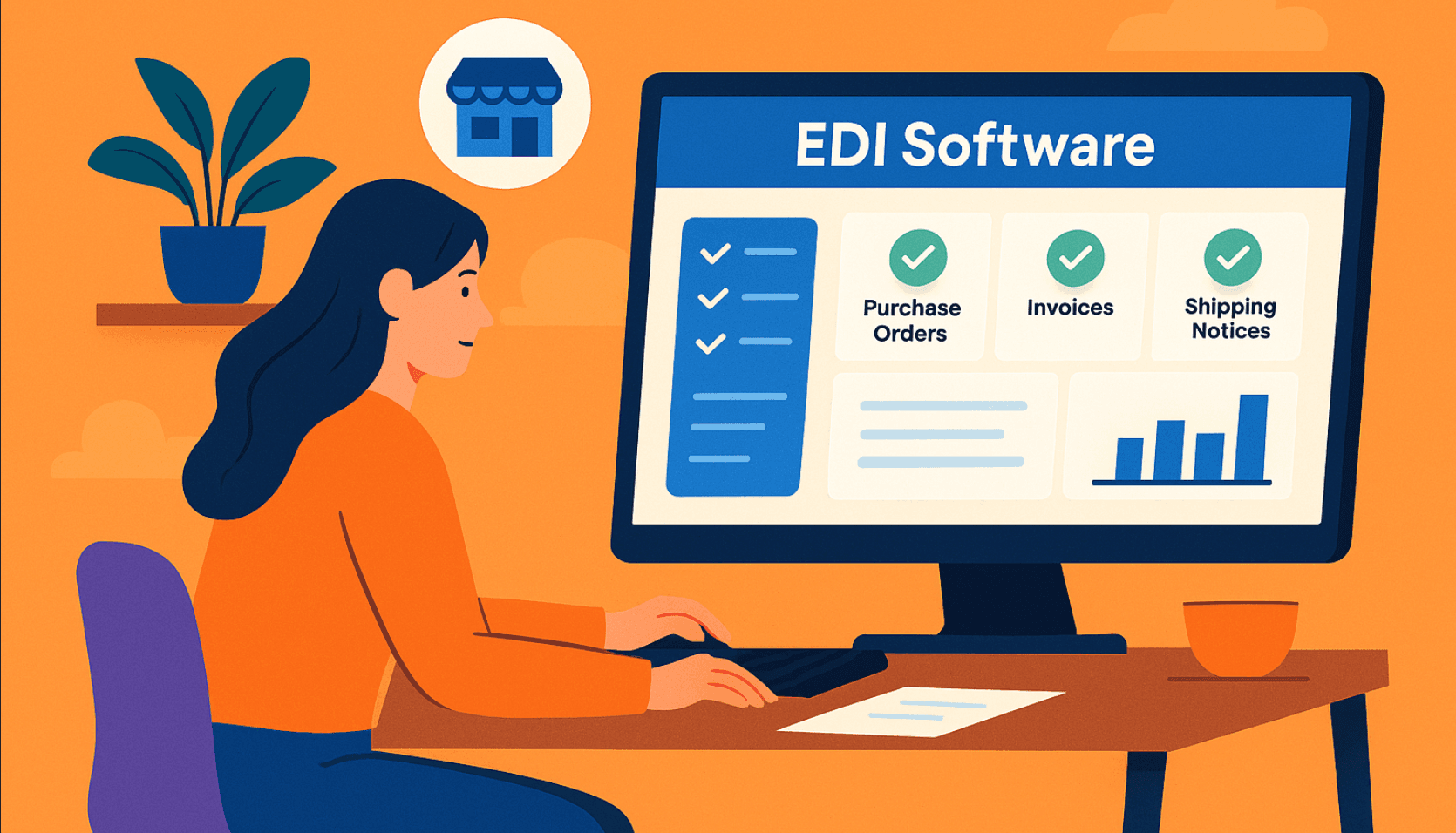Modern EDI software makes B2B data exchange simple and affordable for small teams. Learn how cloud-native EDI platforms like Orderful help you scale.
Electronic data interchange (EDI) has become the backbone of retail and logistics operations, and small businesses or lean teams often assume EDI is too complex or costly to consider. Many small teams frequently view it as a tool reserved for enterprise-level organizations with large IT departments and big budgets.
Today, that's no longer the case. Modern platforms have made EDI accessible, affordable, and easy to manage without the need for specialized staff or dedicated IT teams. Modern solutions give small teams the ability to exchange purchase orders, invoices, and shipping notices with large retailers quickly and accurately without having to strain the budget.
This article dives into the specifics of electronic data exchange for smaller organizations without extensive IT teams. We'll explore how they can adopt practical, cost-effective EDI software to simplify compliance, reduce manual processes, and prepare for long-term growth.
Why Small Teams Need EDI
For small businesses, building strong relationships with business partners hinges on meeting specific requirements. EDI helps level the playing field, giving lean teams the tools they need to work with larger organizations on equal footing.
Partner compliance: Major retailers, distributors, and third-party logistics providers often require EDI partners to implement EDI before doing business, making it a gateway to new opportunities.
Manual order processing: Handling purchase orders and invoices by hand often leads to errors, and it's time-consuming, slowing down operations and increasing costs over time.
Credibility with larger partners: Having an EDI system in place signals professionalism and reliability, strengthening trading partner relationships.
Growth readiness: An EDI integration prepares small retailers and manufacturers to expand into other areas, such as commercial supply or e-commerce fulfillment, by removing barriers to partnerships that require electronic data exchange.
By meeting trading partner specifications, small teams can respond to partner requests without delay and deliver their products on time. Timely operations build trust with business partners and maintain a positive reputation for the supplier.
Common EDI Challenges for Small Teams
EDI is necessary for scaling supply chain operations, but small businesses often run into obstacles when trying to adopt it. Traditional systems were designed for large enterprises, often requiring custom setups. This calls for an experienced internal or outsourced team to navigate, making the whole process complex and cost-prohibitive for lean teams.
Today’s EDI platforms help eliminate many of these barriers, but understanding these challenges early makes it much simpler to adopt EDI and streamline all of your business processes.
High upfront costs with legacy EDI service providers: Traditional systems often require large setup fees and ongoing maintenance contracts, but modern EDI platforms reduce these costs with subscription-based pricing.
Complex setup and testing cycles: Older solutions demand extensive configuration and manual testing, while today’s EDI systems simplify the process with automation and prebuilt integrations.
Per-document pricing models: Paying for each transaction makes it expensive to scale, but predictable pricing models eliminate this budgetary obstacle as business volume increases.
Lack of in-house technical expertise: Hiring or training an EDI specialist can be costly, but cloud-based solutions make it easier for small teams to manage processes without dedicated staff.
Modern EDI Solutions for Small Teams
Today's EDI platforms reimagine data exchange for smaller organizations. Instead of requiring an IT department and costly infrastructure, today’s cloud-native solutions are affordable and scalable from the start. We've outlined several key advantages that modern EDI software provides to small teams with limited resources.
Cloud-Native, API-First Platforms Reduce Overhead
Legacy systems typically require on-premise servers and custom configurations, which tend to be costly and can slow time to scale. Cloud-based EDI platforms run entirely online and integrate directly with business systems through APIs. This reduces hardware costs, eliminates manual processes, and gives small teams real-time visibility into every level of their supply chain.
No Need for In-House EDI Specialists
Managing older EDI platforms often meant hiring or outsourcing technical expertise. Modern solutions automate most of the technical aspects, from mapping to testing and validation. This lets everyday users connect to business partners and exchange documents, freeing up resources and making adoption realistic for teams with limited staff.
Predictable Pricing
Instead of paying per transaction, many modern EDI providers use partner-based or subscription pricing. This model provides cost transparency and makes EDI affordable for small companies, as expenses remain stable regardless of business growth. Predictable billing allows teams to budget with confidence while still gaining enterprise-level capabilities.
Ease of Integration With Business Systems
Modern EDI platforms are designed to connect seamlessly with other applications that small and mid-size organizations already rely on, from enterprise resource planning (ERP) to shipping software. By focusing on B2B integration capabilities, these systems reduce the technical barriers that once made EDI adoption difficult. For a small company, this flexibility means data flows automatically between systems, saving time and reducing errors.
Faster Onboarding for New Partners
Connecting to a new retailer or logistics partner used to take months of configuration and testing. Modern EDI systems streamline this process with prebuilt connections, validation tools, and automation. Small teams can become EDI compliant in days, enabling them to respond quickly to new opportunities.
Visibility Dashboards Simplify Troubleshooting
When errors occur in older systems, identifying the cause often requires IT intervention. Today’s platforms offer an intuitive interface with dashboards that let you see into transactions, order statuses, and potential errors in real time. This improves data accuracy and helps small teams quickly diagnose issues to keep orders moving without delay.
Comparison: Legacy EDI Systems vs. Modern EDI Platforms
Feature | Legacy EDI Systems | Modern EDI Platforms |
|---|---|---|
Infrastructure | On-premise servers, complex installations | Cloud-native, accessible from any browser |
Setup Time | Weeks or months due to manual configuration | Days with automated onboarding and prebuilt integrations |
Pricing Model | High upfront costs, per-document or per-transaction fees | Predictable subscription or per-partner pricing |
Technical Expertise | Requires in-house EDI specialists or consultants | Designed for non-technical users with guided workflows |
Scalability | Limited by hardware and IT resources | Scales instantly with business growth |
Maintenance | Manual updates, software patches, and mapping revisions | Automatic updates and continuous validation |
Integration Capabilities | Custom connections with ERP and logistics systems | API-first design with seamless integrations |
Error Handling | Manual troubleshooting, time-consuming support tickets | Real-time validation and self-serve issue resolution |
Visibility & Reporting | Limited dashboards, technical data views | User-friendly dashboards with full supply chain visibility |
Partner Onboarding | Long testing cycles, slow partner approvals | Automated testing, faster trading partner connections |
Benefits of EDI Systems for Small Teams
Once you remove the barriers of legacy systems, the advantages of adopting modern EDI become clear. Small and mid-size businesses can reduce costs while also operating with the speed and accuracy of much larger organizations, opening doors to new opportunities while keeping operations manageable.
Faster order processing: Electronic exchange of purchase orders and invoices shortens transaction times, helping teams move products through the supply chain more efficiently.
Fewer manual errors and penalties: Automated data exchange reduces human error, which in turn prevents penalties like costly chargebacks and keeps trading partner relationships strong.
Meet partner requirements: Small teams can stay EDI compliant with large retailers and logistics providers without the need to add staff or increase overhead.
Scales as the business grows: A modern EDI system supports new transactions, partners, and higher volumes, allowing organizations to expand without rebuilding their processes.
Why Orderful Is the Best EDI Solution for Small Teams
Modern providers may simplify EDI, but not all platforms are designed with small organizations in mind. Orderful combines the simplicity that lean teams need with the scalability to grow into a fully integrated system, making it a strong fit for businesses with limited resources.
Simple, browser-based EDI: Orderful makes it easy for small and mid-size companies to exchange purchase orders, invoices, and shipping notices directly through an intuitive web EDI portal.
Scales as business needs grow: Teams can start with web access and move seamlessly into API integration, ensuring the system evolves as business volumes increase.
Flat per-partner pricing: A predictable model keeps EDI affordable by removing the financial strain of transaction-based pricing.
Built-in testing and validation: Automated validation ensures compliance and accuracy, so small organizations don’t need to dedicate technical staff to troubleshooting.
Dedicated support and self-serve onboarding tools: Orderful’s knowledgeable team provides direct assistance, while self-service features give small businesses maximum flexibility and faster results.
Orderful empowers your small team to take on any EDI challenge with confidence. Having this system in your toolbox helps you onboard trading partners faster, future-proof your supply chain management efforts, and pace your growth on your own terms.
Simplify EDI Operations for Small Teams and Grow Without Limits
EDI is no longer just made for large technology budgets. With modern platforms, small organizations can reduce errors, save time, and stay EDI compliant with trading partners without added headcount or extra overhead. Small teams can navigate the system with the efficiency to match any large IT department.
Orderful gives smaller teams the tools they need to operate like larger companies while keeping costs predictable and processes efficient. By choosing a system built for scalability, small teams can prepare for future opportunities without sacrificing flexibility today. Contact an EDI expert today to give your company the edge it needs to stay ahead of the competition.
FAQs About EDI for Small Teams
Can a small business use EDI?
Yes. Modern EDI platforms are built with small businesses and teams in mind. They don't just accommodate large enterprises. Cloud-based systems make it easy to get started without hiring IT specialists or investing in new infrastructure.
Is EDI too expensive for small teams?
That was once the case, but it's not anymore. Older systems often required high setup fees and per-document charges. Today’s EDI service providers offer subscription or partner-based pricing that keeps costs predictable and within budget.
What’s the easiest way for small companies to start with EDI?
Many small teams begin with web EDI, which lets them exchange orders and invoices through a simple online portal. As needs grow, they can move into full API integration without switching providers.
- 01Why Small Teams Need EDI
- 02Common EDI Challenges for Small Teams
- 03Modern EDI Solutions for Small Teams
- 04Comparison: Legacy EDI Systems vs. Modern EDI Platforms
- 05Benefits of EDI Systems for Small Teams
- 06Why Orderful Is the Best EDI Solution for Small Teams
- 07Simplify EDI Operations for Small Teams and Grow Without Limits
- 08FAQs About EDI for Small Teams

